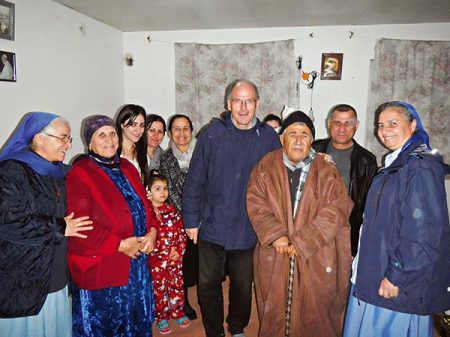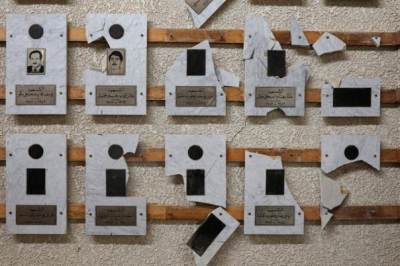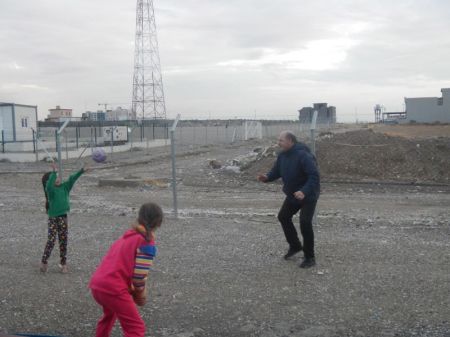The Last Christians: Priest Describes Horror, Courage of Christians Being Killed for Their Faith (Interview)

German author and Catholic priest Andreas Knapp traveled to Iraq where he heard about a young boy who was brutally killed simply for his cross necklace.
"In Mosul, IS terrorists stopped a boy in the street because he was wearing a small cross around his neck. They ordered him to throw it away, and when he steadfastly refused, they buried him alive," Knapp wrote in his newly released book, The Last Christians: Stories of Persecution, Flight, and Resilience in the Middle East.
"Whenever I hear stories like this and meet Christians of such courage, I can't help but wonder: How much is my faith worth to me? How high a price would I be prepared to pay?"
The story is only one of the countless tragedies Knapp witnessed or heard about from survivors and church and human rights workers when traveling to Iraq to speak with Christians who are being wiped out for their faith.
He shares many of those shocking stories as well as accounts of incredible courage in his book.
"I never fail to be impressed by the deep faith displayed by Eastern Christians. For the sake of Jesus Christ, they have suffered all kinds of harassment and even given up their homeland. Friends and relatives — including children — have paid for their Christian beliefs with their lives," Knapp wrote.
The book explores fundamental questions about the future of Christianity, particularly when it concerns Aramaic Christians: Will they be killed off or scattered as refugees across the world, losing forever the language that Jesus spoke and their homelands where they lived for two millennia?
The Last Christians, which was released in September, also investigates some of the political currents that led to the formation of the Islamic State, such as the U.S.-led war on Iraq and dictator Saddam Hussein in 2003.
It describes a number of the severe attacks Christians have suffered at the hands of IS, but also from other extremist groups, including al-Qaeda, which increased its attacks on civilians after 2003.
Churches in Mosul were bombed, Christian schools were threatened with destruction unless the students converted to Islam, 5-year-old children were shot dead on their way to mass, and Christian girls were raped for refusing to wear veils, the author described. Now with the rise of IS, thousands of Yazidi and Christian women and young girls are being sold in modern-day slave markets.
Accounts tell of young women being raped for days by dozens of men, begging to be killed in order for the torture to stop, but only to be met with laughter and cynical remarks. One Christian girl who suffered "bestial abuse" at the hands of IS took rat poison to end her life, suffering a long, drawn-out death.
Other stories, such as one from the ancient Christian town of Sadat, tell of 45 men, women and children who were tortured, killed, and buried in a mass grave by radicals. Some of the young men were taken prisoners, but those who refused to renounce their faith and embrace Islam where shot dead.
"Whether Mosul or Tur Abdin, Damascus or Ma'loula, these places where the first Christians once gathered and prayed in Aramaic might now be inhabited by the last Christians to do so," Knapp noted in one passage.
Amid the grim accounts, The Last Christians also shares the powerful dreams Jesus believers and refugees fleeing war have experienced and the hopes they have for a new life abroad.
One of the central questions the book focuses on is how Christians respond to such horror and to the prospect of being wiped out from their ancient homelands. Christians talk about their desire to defend themselves and their loved ones, but point to the heavens and talk of Jesus, who they say is against retaliation and using force, a model they have followed for millennia.
Below is The Christian Post's email interview with Knapp about The Last Christians:
CP: In the book, you point out some of the mistakes that Western political leaders made, such as former President George W. Bush calling the war on terror a "crusade" back in 2001. Do Iraqi Christians consider American intervention in 2003 that led to the fall of Saddam Hussein something that overall has made their lives worse?
Knapp: The political situation in Iraq was and is very complex. Saddam Hussein was a cruel dictator and responsible for a lot of crimes. His leadership was not marked by religious ideology, but by secular socialism. So the differences between the Sunni and the Shiite populations didn't matter or were put down by force. On the other hand the Kurdish movement for autonomy was oppressed in horrible ways. The Christians were not involved in these tensions within Islam or with Kurdish nationalism. So my Christian friends coming from Iraq confirm that under Saddam they could live more or less in peace, do their job, and live their Christian faith.
It's true that ever since the founding of Al-Qaeda there has been some aggression against Christians in Iraq. But Saddam Hussein oppressed these radical Islamist movements. The situation changed radically when Saddam Hussein was attacked by the coalition forces led by America. Iraq decayed and civil war began. The old tensions between the Sunnis and Shiites reappeared. The Christians lost every civil security. All the Christians from Iraq I know confirm that after 2003 their situation became worse and worse — until they were exiled when ISIS conquered Mosul and the Christian villages in the north of Iraq.

CP: The Last Christians describes on several occasions the horrific, graphic attacks and rapes Christians have suffered at the hands of radicals. What do victims and survivors most need to be able to rebuild their lives and overcome such darkness?
Knapp: Meeting the victims of persecution I often notice signs of deep trauma. Sometimes they don't speak about it. When they arrive in Germany the first step is to face the new situation: to learn another language, adapt themselves to a foreign culture, and deal with an unfamiliar bureaucratic system. So all their energy is concentrated on surviving in a new environment.
But step by step they notice the deep pain which they brought with them. For example, at school the children show strange behavior: they don't want to play; they hide themselves under the desk; they keep to themselves and don't want to speak.
We look for psychologists to help these children speak about their past and their feelings, their pain, anxiety, and fear. The adults also have to speak about what they have lost. I often see adult men and women crying when they begin to recount their suffering.
It is very important that the victims feel that now they can live in peace and security. When the parents notice that their children are growing well, that they find friends and enjoy their lives, this can help to heal the wounds. Simply to be treated with goodwill, to be accepted and to experience friendship, can help to overcome the wounds of the past.
But there is also a difficulty to be mentioned: If the refugees arriving in Germany are confronted with xenophobia, with a general rejection of all foreigners, then they become newly afraid of being discriminated against and persecuted. In such an atmosphere the wounds can't heal.

CP: In one point in the book, you wonder "does religion sometimes destroy our humanity?" In the wake of so much carnage and genocide, do you feel organized religion has done more harm than good? Or does it still have an important role to play in providing structure and hope?
Knapp: All human institutions are marked by ambiguity, because every human being is ambiguous. This is also true of religions. I'm convinced that at the origin of human culture religion played an important role to humanize civilization. To forbid murder and to respect life, marriage, and the goods of others — these humanitarian rules and many others can be traced back to religion.
At the same time a religious system can become perverted if it is used to oppress people or to justify violence. So there should be a separation between politics and religion. The domain of religion should be the spiritual life, which can't be forced from outside because nobody can see the inside, the heart of a person. Jesus resisted the temptation to use political force to disseminate his message. He refused to be the king of the world. So the Christian message of the separation of spiritual conviction and political power is an important step to purify religion.
When religion refuses to dominate people by force, but looks to win hearts, then it can be an important element in defending basic human rights such as freedom of religion.
CP: What do you feel Western media most often gets wrong, or misses out when reporting on the persecution of Christians and other minorities in the Middle East?
Knapp: I'm saddened and disturbed by the fact that the media often conceal or ignore news about the persecution of Christians. I don't understand why this happened in Germany for a long time. I think the public simply didn't want to accept this truth. Maybe there are ideological prejudices: many people know nothing about the history of the church other than the Crusades, so they see Christians only in the role of aggressors. This reading of history misses the fact that the Middle Eastern churches never participated in a Crusade. On the contrary, they have been persecuted for centuries, right up to present time.
Lately some German media have become more aware of this historical fact and have reported well about what is happening to Christian communities in Iraq, Syria, and Egypt.
CP: You recall several incidents of Christian children being beaten and even murdered for their faith, refusing to deny Jesus Christ. What should such remarkable courage teach adult Christians?
Knapp: Listening to the stories told by my Christian friends from Syria or Iraq, and reading reports about the faithfulness of the Middle Eastern Christians, I was deeply touched. And I wondered whether I would also be faithful to Jesus in such difficult conditions. As an adult Christian have the attitude to reflect and to calculate: Is it necessary to bear witness to Jesus in such an absolute way? What will my neighbors who don't believe in God think about me if I confess my faith? I have lost this childlike behavior which is open, direct, unfeigned, without distrust.
So the witness of children or teenagers can open our eyes for the truth of the Gospel: "I praise you, Father, Lord of heaven and earth, because you have hidden these things from the wise and learned, and revealed them to little children." (Matthew 11:25)
CP: You explore the great personal and spiritual dilemma that Christians are faced with when deciding whether they should use physical violence to defend themselves and others. Is it fair to say that the dilemma becomes increasingly difficult, when entire Christian populations are in danger of being wiped out? Are Christians, in the worst case scenario, prepared to continue resisting war, even if it means that they disappear from the Middle East?
Knapp: I think that here we should distinguish between the level of personal and political/social responsibility. The decision to remain nonviolent can only be taken on a deeply personal level. To be ready for martyrdom is an extremely personal decision which I can never take for other persons.
On the social and political level those responsible have to react if there is an aggression against a city or a people for whom they are responsible. In the worst case they may have to call the army to defend an innocent people.
At the same time a Christian leader should never oblige a Christian to use a weapon or to kill somebody. He has to respect the liberty of conscience which can feel obliged by the words of Jesus: "Love your enemies, do good to those who hate you, bless those who curse you, pray for those who mistreat you." (Luke 6:26-28)
For the Christians in the Middle East who decided — in the majority of cases — to remain nonviolent, the consequence can be to be extinguished in their homeland. This decision can only be understood from a spiritual point of view: like Jesus they preferred to be victims of unjust violence than to fight with a sword. We have to respect such very personal decisions. They challenge our own faith in the kingdom of God, which, as Jesus said, is not of this world.





















